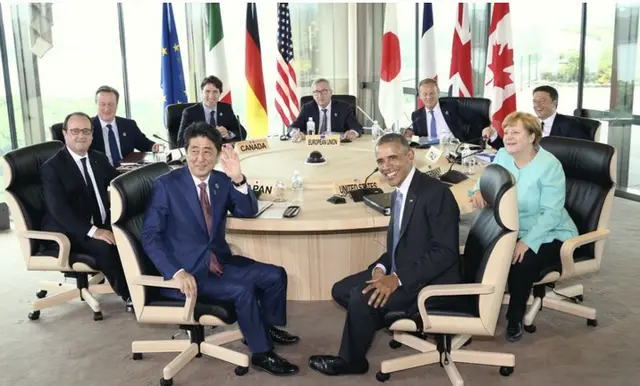Leaders of the Group of Seven (G7) had differing opinions on how to stimulate a sluggish world economy at a summit that ended Friday, while Japan spared no efforts to promote its own interests.
Divergence on how to boost economy
During the summit held in Ise-Shima, central Japan, on Thursday and Friday, Japan appealed for enlarging public spending while Germany was cautious about a flexible fiscal policy and wanted to focus more on structural reforms.
In a plenary session, Japanese Prime Minister Shinzo Abe said the global economy faced the risk of falling into a "crisis," drawing comparisons with the mood when Japan last hosted a G7 summit in 2008, just months ahead of the collapse of Lehman Brothers that later turned into a worldwide financial crisis.
In response, German Chancellor Angela Merkel questioned whether the current situation was grave enough to use the term "crisis," an AFP report quoted a senior Japanese official as saying.
Merkel has repeatedly opposed the notion that the world's major industrial countries need to spend their way out of the current slowdown, advocating instead a paying down of debt, the report said.
Besides, at a G7 finance ministers' meeting that concluded last Saturday, Japan and the United States failed to narrow their gap over the foreign exchange market.
Japan is mulling to continue its monetary easing if necessary after a recent appreciation of the Japanese yen, while the U.S. Federal Reserve has sealed off its loosening policy.
Amid such a divergence, the G7 on Friday released a final statement,vowing "a more forceful and balanced policy mix" to "achieve a strong, sustainable and balanced growth pattern" by taking each country's circumstances into account, while continuing efforts to put public debt on a sustainable path.
Takao Kamakura, a professor emeritus of Japan's Saitama University, said that like the G7 finance ministers' meeting, the G7 summit, which failed to reach a consensus on economic problems, has hardly yielded any results to improve the world economy.
Japan promotes own interests
Tokyo has spared no efforts to promote its own interests, which highlight justifying delaying a consumption tax hike and deflecting attention from the summit's focus on economic issues.
For a second time, Abe has decided to hold off a consumption tax hike planned for next April, local media reported Friday, citing sources close to the prime minister.
The decision was expected to be announced as early as Monday, and the tax hike could be put off for two years or 18 months until the autumn of 2018 when Abe's term as president of the ruling Liberal Democratic Party expires, said Japan's Kyodo News.
Japan decided in 2012 to increase the sales tax by 3 percentage points to 8 percent in April 2014, and then to 10 percent in October 2015, in order to raise tax revenue and to turn the primary balance into a surplus by the fiscal year 2020.
Abe postponed the second tax hike in November 2014 amid sluggish economic growth, and has repeatedly said since then that preconditions of the delay are a "finance crisis similar to the 2008 Lehman crisis and disasters like the earthquake and tsunami in 2011."
Abe earlier said the outcome of the G7 summit would be a factor for his decision. By telling other G7 leaders that the current global economic conditions look similar to "the situation before Lehman," Abe was finding an excuse for delaying the tax hike.
The further delay is likely to put a brake on Japan's efforts to pursue fiscal consolidation, as its fiscal health is the worst among major industrialized economies with public debt at more than 200 percent of its gross domestic product.
Besides, Japan, as a G7 host, deviated from the summit's agenda, which was focused on economic issues, by introducing topics such as the South China Sea issue, which is not conducive to the development of the G7 mechanism but undermines regional peace and stability.
Abe also introduced other topics linked to his policy priorities, including fighting terrorism and pandemics, infrastructure construction and a focus on women's empowerment, which Abe has promoted as "womenomics." Enditem
 简体中文
简体中文

